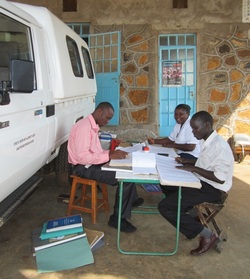| DEVELOPMENT AND CAMPAIGNING GOING DIGITAL It was reported recently in The Guardian that social media and mobile technologies offer a wide range of benefits for people engaged in development. They are a potentially cheap and efficient way to link citizens with their governments, the chance to monitor real-time progress on projects, and the ability to connect people from remote parts of the world to share experiences and teach best practice. A new mobile app from the World bank's finances team lets users find and monitor bank-funded projects near to where they live, so that they can see where the aid money goes and who wins the contracts funded. It will also allow users to share what they find, give feedback on data accuracy issues and report allegations of fraud and corruption Rwanda's health minister uses Twitter. The minister and her team respond directly to questions that come in from the people via Twitter and prize the possibility to be transparent, accountable and accessible to Rwandans. Digital Green is a grassroots campaign in India, supported by international donors and the Indian government, that uses social media to share agricultural best practices. The site hosts thousands of videos by and for farmers, covering topics from seed treatment to income generation. Over 125,000 farmers, 70% of whom are women, use the scheme. I Paid a Bribe is an anti-corruption movement that harnesses the power of collective voices. Users are encouraged to report anonymously on corrupt acts, through a website, email or SMS. The reports are mapped on the site and used to inform campaigns for better governance. The movement is active in India, Greece, Kenya, Pakistan and Zimbabwe, after its founder, Tawanda Kembo, was pressured to pay a bribe by a corrupt police officer. It will be coming soon to the Philippines and Mongolia. In my concern for justice, both in this country and across the world, especially in issues involving those living in poverty, I have been involved in a large number of campaigns using email and have frequently wondered just how effective they are. However now the campaigning organisations report on the successes of their campaigns and a number have reinforced their reports at the year's end, giving a list of successes. This made me realise that such campaigning is certainly producing results and is of course much simpler and cheaper than writing numerous letters to politicians. For example, Save the Children claim success with David Cameron's announcement that a major hunger summit will be held in June this year and that the UN have increased monitoring of crimes against children. Greenpeace reported that 2.2 million people demanded that the Arctic be protected from oil companies who threaten the fragile environment. A number of big companies (e.g. Zara, Levi's, Mango and Waitrose) agreed to change their policies as a result of the large numbers who demanded this by way of email campaigns. So please note, these are definitely worth while! | ETHICAL INVESTMENT AND MISSION Medical Mission Sisters belongs to two organisations concerned with ethical investments: CIG (the Church Investors' Group) and ECCR (the Ecumenical Council for Corporate Responsibility). I am on the Board of the latter and one of the two designated members of the former (the other being our General Treasurer) to attend meetings and receive information. CIG is church-based and concerned with providing information about companies in which members are interested in investing, to help them to vote at annual general meetings and to encourage the formulation of investment policies based on Christian ethical principles. They encourage responsible business practices through engagement with company managements and I have attended some of these meetings that are likely to be appropriate to mission for us. ECCR is different in that it welcomes both corporate and individual members. ECCR corporate membership is open to all church-related and other organisations that wish to support and be involved in our activities. Members, both organisations and individuals are encouraged and supported in their engagement with companies and churches. Considerable information is provided to enable appropriate action regarding unethical activity of companies. ECCR has produced an excellent report on the banks recently and has on-going concerns about extractive industries (oil and minerals) and the damage so often caused in developing countries including those in which we have members. It has frequently been helpful that I can have contact with people in mission, both as MMS and being on the Executive of the Catholic Missionary Union, to give first-hand information about those affected. I was able to read and review a book about BP and the effects of its actions across the world, resulting in both environmental disaster and loss of life. That was a real eye-opener for me too. I am currently reviewing a book by a former Board member called “The Common Excuses of the Comfortable Compromiser” that deals with the kind of things that people can easily ignore but still see themselves as behaving ethically. It is quite complicated and difficult, but then, so is the subject! This year the CIG annual meeting was addressed by two people in Corporate Social Responsibility (CSR) management of G4S, the company that failed to provide the security at the Olympics. It was possible to ask questions about particular concerns that that would inform potential investors and give them necessary information if they wish to dialogue with the company as investors. At the same meeting we heard about a visit of a member of the Methodist Church to the operations of Shell in Nigeria. He needed to be escorted because of the danger of being kidnapped. He was able to see the effects of oil spills polluting the land and causing explosions that endanger life. There are frequent thefts of oil from pipelines basically caused by the fact that although government and business people benefit from the oil, millions still live in dire poverty in Nigeria. ECCR members as well as CIG members have a long history of engagement with Shell on these problems. More recently I was able to meet with with representatives of Sainsbury's to hear about their commitment to the environment, to health and to sustainability. Their achievements and future plans are impressive. I have appreciated the efforts that the churches are making to see ethical investing as part of mission and hope that these ideas will become more widely appreciated in Christian circles everywhere. |
|
0 Comments
 Fransiscan Missionaries of St Joseph at work in Kenya http://www.fmsj.co.uk/ministries/ecuador-kenya/  On Monday 7th January 2013 a crowd of CMU members gathered in New Barnet for a celebration of Mass and a networking event. It was the first opportunity to congratulate Alice Davidson OBE on her recent honour - long standing trustee of the CMU who was involved in our foundation in this current form. (she is pictured - left with main celebrant of the Mass Fr Rob Morland SMA At the mass we prayed for missionaries throughout the world- especially those in danger. The homily was given by Fr Peter Burrowes SMA and reminded us that throughout Scripture God calls people to 'go out' - not least in the story of the Magi. |
Archives
March 2017
Categories
All
|

 RSS Feed
RSS Feed